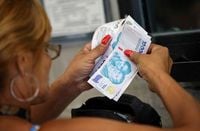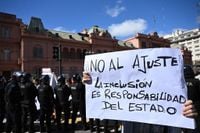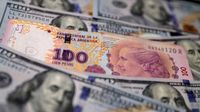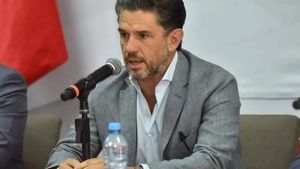The Argentine peso experienced a significant devaluation of 8.4% at the opening of markets on Monday, April 14, 2025, according to Banco Nación, the state-owned bank. The peso opened at 1,190 per dollar, a notable rise from Friday's rate of 1,097, following the announcement of a partial release of exchange controls that had been in place since 2019. This devaluation is largely a reaction to the government's suspension of restrictions on foreign currency purchases, a move that came after securing a $20 billion loan from the International Monetary Fund (IMF).
President Javier Milei, who has been in office since late 2023, celebrated the end of the 'cepo,' which previously limited individuals to purchasing only $200 worth of foreign currency per month. "There is no longer an official dollar; there is a single dollar, which is the market dollar," Milei stated on Radio El Observador, emphasizing that the removal of these controls was a campaign promise. The recent changes coincide with a visit from U.S. Treasury Secretary Scott Bessent, who met with Milei on the same day to discuss the economic situation.
The new exchange rate system allows the peso to fluctuate according to supply and demand, with a floor of 1,000 pesos per dollar and a ceiling of 1,400 pesos. The Central Bank retains the ability to intervene to maintain the currency's value within these limits. Santiago Furiase, a member of the Central Bank's board, advised caution, stating, "We need to lower expectations a bit for this first day; we are prepared, but it will be a process." He noted that if the peso reaches the ceiling of the band, it implies a depreciation of 30%.
As of April 14, individuals can now purchase an unlimited amount of dollars through banking transactions and up to $100 in cash. However, businesses must wait until 2026 to remit dividends abroad. This shift comes after the Central Bank had to sell over $2 billion to stabilize the peso during the recent currency crisis.
In Buenos Aires, the streets reflected an atmosphere of uncertainty. Currency traders, who usually crowd the area on Florida Street, were noticeably absent, with one trader commenting, "Everyone is waiting to see what will happen." The government's reliance on the exchange rate as an anchor for inflation expectations raises questions about the new measures' potential effects on prices.
Inflation control is a critical aspect of Milei's political capital, especially as he faces his first electoral test in the upcoming legislative elections in October. The president's stringent austerity measures, which included severe cuts to pensions, education, and healthcare, have resulted in a drop in inflation from 211% in 2023 to 118% last year. However, the pace of inflation's decline slowed in February and March, raising concerns about the sustainability of the current economic strategy.
In a joint press conference with Milei, Bessent expressed his support for the president's efforts, stating, "I am excited to make this trip to initiate the first formal discussions on reciprocal trade between our countries." The U.S. Treasury Secretary emphasized the importance of establishing a free trade agreement with Argentina, suggesting a willingness to move away from Mercosur, the regional trade bloc.
Despite the optimism surrounding the IMF's support and the new exchange rate regime, analysts caution that the initial effects of the peso's devaluation could lead to a temporary spike in inflation. André Perfeito, an economist, noted, "The devaluation is a necessary step for the type of flexibility the Argentine government wants." He added that while there may be short-term inflationary pressure, the long-term outlook could improve investor confidence in Argentina's economy.
The IMF's agreement includes targets for maintaining a 'zero deficit' budget and accumulating foreign reserves, which are crucial for stabilizing the economy. The initial $12 billion disbursement from the IMF is expected to be followed by additional funds later in the year.
As the Argentine government navigates these changes, the potential for economic recovery hinges on the successful implementation of the new policies and the response of the market. The recent devaluation has already led to a slight recovery in the prices of Argentine bonds, which saw some maturities gaining over four cents on the dollar.
In summary, the Argentine peso's dramatic devaluation reflects a broader economic strategy aimed at stabilizing the country's currency and attracting foreign investment. While the removal of exchange controls is a significant step forward, the government must now manage the complexities of inflation and market expectations in the months ahead. As President Milei boldly stated, "By mid-next year, the problem of inflation in Argentina will be over." Only time will tell if these ambitious plans come to fruition.








